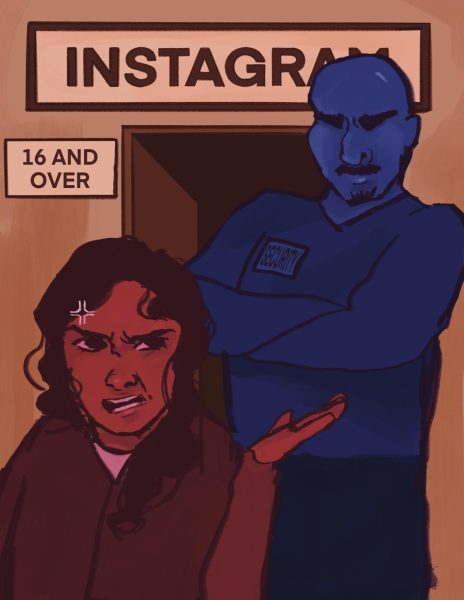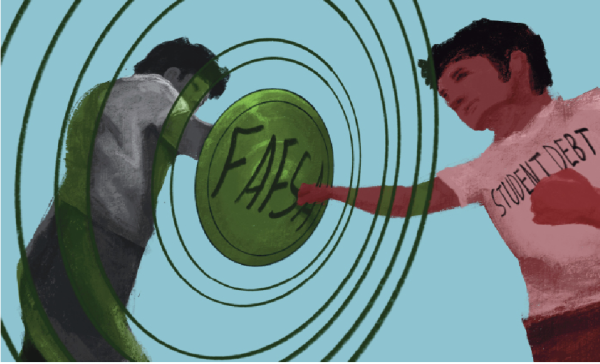Bill aiming to ban traditionally violent video games is illogical
March 4, 2021
The age-old debate of whether violent video games cause real-world violence is making a comeback. Illinois State Rep. Marcus Evans Jr. (D) filed a bill on Feb. 19 that aims to prohibit the sale of violent video games, specifically the sale of Rockstar Games’ “Grand Theft Auto” series, in Chicago (Illinois House Bill 3531) amid the recent increase in Chicago-area carjackings, in which several were committed by teenagers. Once again, the almost decade-old video game “Grand Theft Auto V” is back in the spotlight as the fall guy (or “fall game”) for an increase in real-world violence.
Not only does Rep. Evans aim to ban the sale of other “violent video games” in the future, but the bill — which was referred to the Rules Committee on Feb. 22 — also aims to change the definition of a “violent video game.” This new definition would classify any games in which a player can “control a character within the video game that is encouraged to perpetuate human-on-human violence in which the player kills or otherwise causes serious physical or psychological harm to another human or an animal” as a violent video game. Well, I guess it’s time to say goodbye to “Ultimate Fishing Simulator 2,” as it would be considered a violent video game under this bill. Last I checked, fish are harmed when they get hooked through their mouth and I’m assuming it’s pretty psychologically scarring for fish when they get pulled from the water by their lip at high speed but again, I can only assume that experience is traumatizing.
Obviously, I’m being sarcastic and the idea of the bill is to target video games that are traditionally thought of as violent, games such as the “Call of Duty” series and the “Grand Theft Auto” series, in an attempt to quell real-world acts of violence. However, this simply doesn’t make a lot of sense as it wouldn’t prevent the problem of real-world violence because video games aren’t the problem, especially not a game from 2013 that is irrelevant to the timeline of these carjackings. There are other more pressing issues that are the cause for this spike of crime in Chicago.
Banning violent video games doesn’t prevent real-world violence and playing these types of games does not directly cause acts of violence. The American Psychological Association adopted a 2020 resolution, updated from 2015, that states there “is insufficient scientific evidence to support a causal link between violent video games and violent behavior.”
I am one of the millions of Americans who have played “traditionally violent” video games. Some of these games I’ve played include Rockstar Games’ “Red Dead Redemption 2,” Ubisoft’s “Far Cry 5” and “Far Cry New Dawn,” and Techland’s “Dying Light.” These are absolutely considered violent video games. “Red Dead Redemption 2” is centered around the story of a gang of outlaws who rob and kill their way across America. Missions range from bank heists, horse theft, hunting animals and almost every mission has you kill human enemies with weapons ranging from six-shooter revolvers, shotguns, repeaters and rifles. “Far Cry 5” throws you into the beautiful fictional region of Hope County, Mont., where a doomsday cult has forcefully taken over the region. Players can use vehicles with mounted machine guns, explosives, various firearms and melee weapons to fight back against the cult. “Far Cry New Dawn” puts a “post-nuclear-apocalyptic” spin on “Far Cry 5” and gameplay is more of the same: bad guys take over a region, use various weapons to free said region. “Dying Light” drops you into the middle of a bloody zombie apocalypse in the fictional Middle Eastern city of Harran. The game has you face off against waves of the undead, as well as human enemies, using crudely crafted melee weapons made from hammers, crowbars, axes and other tools you can find throughout the city, and the combat is brutal. It is absolutely warranted to say these games are exceptionally graphic at times. You can blow off an enemy outlaw’s leg with a shotgun, use a flamethrower to roast a truck full of bloodthirsty cultists or use a water pipe you found laying around to completely cave in the head of a zombie that has just bitten you.
To say these games don’t display acts of violence would simply be untrue. However, after playing these games I have never felt the urge to rob a bank or stick up a store and ride off on a recently stolen horse, drive around in an armored machine gun-mounted truck while tossing explosives out of the window, or bash someone on the head using a crowbar that has nails welded to it. While these are all extreme examples, the point is I have played violent video games for a few years now and have never felt the desire to commit a crime, rob a bank, kill anyone, or cause physical harm to someone, and that goes for the majority of Americans who play these types of video games. One reason is that people understand that none of it is real. Everything on screen is fictitious, it’s a series of ones and zeros coming together to produce an image on a screen for the sole purpose of providing entertainment, which is why most people don’t have a problem playing these types of video games. Being able to discern reality from fiction is why most people aren’t encouraged by video games to commit real-world acts of violence, and because most people are upstanding law-abiding citizens with a conscience. When someone does not have the ability to understand the difference between reality and fiction is when it becomes a problem.
If banning violent video games is the best way to deter acts of real-world violence and crime, then the next step should be to ban all other kinds of media that portray these acts. Movies and TV shows like “Law & Order,” “The Punisher” and “The Italian Job” that depict bank heists, shootouts between police and criminals, violent killings and other criminal activity should be banned from airing on TV or being viewed in movie theaters, as well as being purchased. Movies and TV shows like Westerns should be banned as well, especially since many romanticize the outlaw way of life.
“But that’s completely different!”
How so? Let’s do a comparison. A key element of the “Grand Theft Auto V” story is when players carry out a mission that has them rob a bank referred to as the Union Depository, in which the three main characters of the story can make off with up to $201,600,000 worth of gold bullion. “The Italian Job,” a movie, is centered around a heist in which the main characters aim to steal $35 million worth of gold bullion from a safe in Venice. Both portray the crime of robbery, so why not ban the movie as well? Movie producer Quentin Tarantino’s films are known for the aestheticization of violence, and one of his more popular films comes to mind. Tarantino’s western film “Django Unchained” depicts scenes in which horses are stolen multiple times, many people are shown to be killed in an incredibly violent manner through the use of dynamite, shotguns, revolvers and rifles. Scenes of torture and brutal hand-to-hand fights to the death are present. During the movie several men are shot, multiple times in some cases, by the heroes of this film and are in immense audible pain for several moments before they are finally put out of their misery. In the final shootout of the film, Django spills enough of his adversaries’ blood that large parts of the walls in the house where the shootout takes place are literally repainted red. And these scenes are even more striking since the movie is made to look like all these terrible things are actually happening to real human people. Not computer-generated, human-like 3D models that look very close to living people like you’d see in “Red Dead Redemption 2,” but actual living people. So why do we consider banning video games that portray acts of violence, but not movies? Senior Albert Pont, a good friend I play video games with, puts it perfectly.
“If you follow this same train of thought, then TV shows or movies that portray these types of [crimes] should also be banned,” Pont said. “Since many people view shows or movies that have content that is as, if not more, graphic than the stuff in video games, they should also be included in the bill. Compared to the [number] of people that play video games on a regular basis, individuals that watch TV shows and movies that contain these violent actions are much greater, leading to a more profound effect on the population.”
While Rep. Evans’ effort to deter acts of real-world violence with this bill is admirable, it is simply illogical. Considering Americans on terrorist watchlists are still eligible to purchase firearms, a bill enforcing stronger background checks on individuals with criminal backgrounds may be more beneficial in reducing the number of crimes involving acts of violence. Perhaps a bill focusing on the creation of programs that provide insight into how parents of underprivileged families can prevent their children from being indoctrinated into the unforgiving world of crime would be a step in the right direction. An increased law enforcement presence in areas of high crime may deter potential criminals from committing these acts as well. It should be obvious to any 16-year-old who is able to buy a gun is far more dangerous than one able to buy a copy of the latest “Call of Duty” game.
















